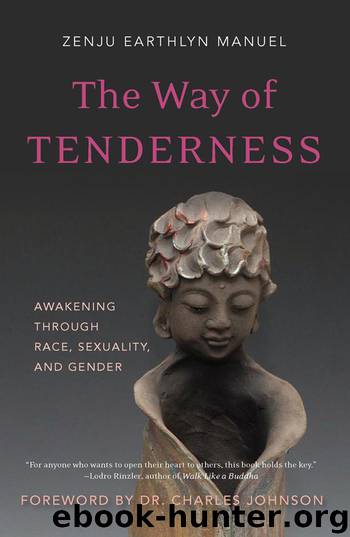The Way of Tenderness: Awakening through Race, Sexuality, and Gender by Manuel Zenju Earthlyn

Author:Manuel, Zenju Earthlyn [Manuel, Zenju Earthlyn]
Language: eng
Format: mobi
Publisher: Simon & Schuster
Published: 0101-01-01T00:00:00+00:00
We all run up against social borders in our lives that can seem as wide as oceans, or as narrow as creeks. Eventually we are compelled to cross into unknown territory, to venture onto dangerous or forbidden ground. Yet the most difficult borders to cross are the ones within ourselves—the ones we can’t touch but which we certainly feel.
For fifteen years prior to taking up the practice of Zen I had been studying Buddha’s teachings with the Soka Gakkai, a lay organization, centered on the teachings of Nichiren Daishonin.5 I practiced devotion and concentration largely with practitioners who were much like me in terms of their embodiment and lived experience. Together with them I learned the power of chanting and how rhythm can change the course of one’s life. Still, even with such power at hand, my inability to face suffering persisted. The process of attending to such suffering with chanting was not enough for me.
When the gateway to Zen opened I wasn’t seeking it. I had no particular desire to understand Zen. At first I was resistant to teachings of emptiness, no self, or impermanence with regard to the felt presence of hatred in my life. Zen practice seemed to me to be an individual practice that paid no attention to socially imposed suffering. So when I did come to Zen practice I needed something to bridge the gap between where I stood in my life and the Zen teachings being espoused. Despite my inability to immediately embrace the teachings, the constant pull toward liberation and the urge to ease suffering demanded that I stay and see what the Zen perspective really had to offer.
At the beginning, I joined a people of color Zen group. I had a sanctuary in which to share my experience and where I could cry when needed without having to deal with the unfamiliar world of the Zen center. From the sanctuary of the people of color group I could contemplate whether I was ready for the stripping down of beliefs that Zen requires on the path of liberation. I slowly developed trust in Dogen’s basic Zen teaching: To study the Buddha Way is to study the self. To study the self is to forget the self. To forget the self is to be enlightened by the ten thousand things.
When I first heard this teaching I did not want to forget about being who I was or about my collective identity as an African American. At the time, I felt that “to forget the self” meant to let myself disappear without a trace. I was concerned about what this would mean to my life given the suffering I had endured living in a dark-skinned body. Was I to forget the suffering as well? Later I learned that when Dogen said “forget the self,” he didn’t mean to render ourselves unconscious or develop an acute case of amnesia, but rather to untangle ourselves from what we believed was “real” about ourselves and the world around us.
Download
This site does not store any files on its server. We only index and link to content provided by other sites. Please contact the content providers to delete copyright contents if any and email us, we'll remove relevant links or contents immediately.
The Lost Art of Listening by Michael P. Nichols(6458)
Why I Am Not A Calvinist by Dr. Peter S. Ruckman(3765)
The Rosicrucians by Christopher McIntosh(3044)
Wicca: a guide for the solitary practitioner by Scott Cunningham(2700)
Signature in the Cell: DNA and the Evidence for Intelligent Design by Stephen C. Meyer(2493)
Real Sex by Lauren F. Winner(2466)
The Holy Spirit by Billy Graham(2406)
To Light a Sacred Flame by Silver RavenWolf(2349)
The End of Faith by Sam Harris(2276)
The Gnostic Gospels by Pagels Elaine(2021)
Nine Parts of Desire by Geraldine Brooks(2001)
Waking Up by Sam Harris(1950)
Heavens on Earth by Michael Shermer(1950)
Devil, The by Almond Philip C(1895)
Jesus by Paul Johnson(1881)
The God delusion by Richard Dawkins(1841)
Kundalini by Gopi Krishna(1820)
Chosen by God by R. C. Sproul(1754)
The Nature of Consciousness by Rupert Spira(1686)
